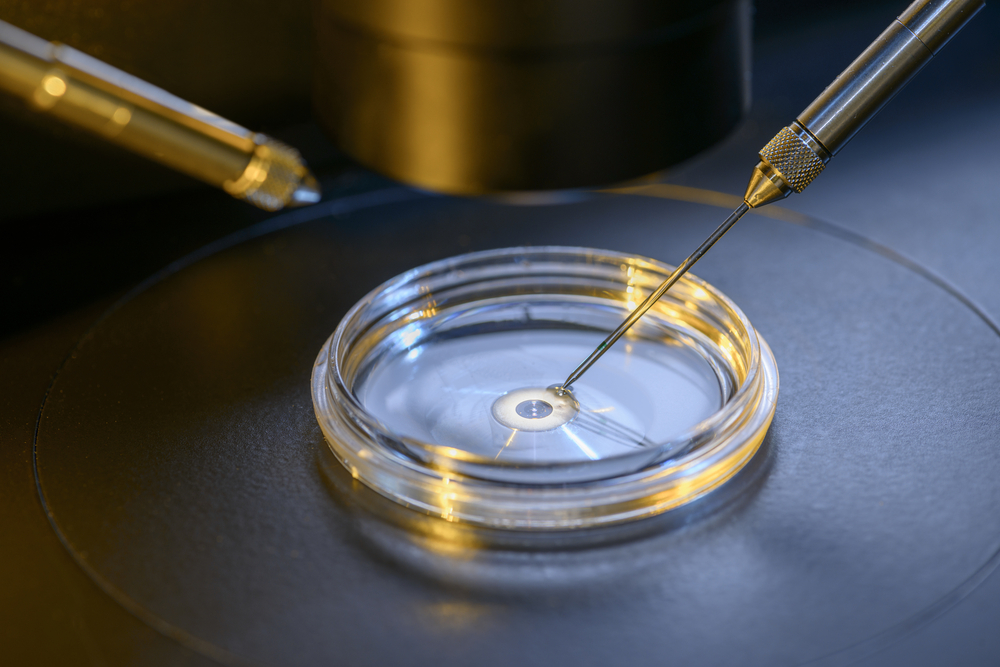Prospective parents at risk of passing inherited conditions to their children have a few options when it comes to family planning, including having a child without medical intervention, adopting a child or choosing not to have children at all. For individuals and couples who want the experience of being pregnant while reducing the genetic risk to their offspring, they can elect to have preimplantation genetic testing (PGT) or use a sperm or egg donor.
Use of Gamete Donors as a Successful Alternative
Choosing to use donor gametes — either sperm or eggs — is very common among couples struggling with infertility. Donor sperm may be used in situations with same-sex female couples, women who have not found a reproductive partner or in couples where the husband/partner has no sperm or very poor semen analysis. According to RESOLVE, healthy women under the age of 35 have the highest success rates of getting pregnant using donor sperm. One study found that the overall cumulative pregnancy was 86 percent in women who underwent intrauterine insemination (IUI).
Using an egg donor is a potential solution for same-sex male couples (paired with a surrogate to carry the pregnancy), or women who have a low ovarian reserve or fewer viable egg cells. According to the U.S. Centers for Disease Control and Prevention, 12 percent of all IVF cycles in the U.S. involve eggs retrieved from a donor, which is about 16,000 per year. Furthermore, donor-egg IVF has the highest success rate of any complex fertility treatment, ranging from 52 percent nationally to 75 percent at the top clinics.
For individuals and couples at risk of passing on a genetic disorder who do not want to do PGT, using a gamete donor is a common option that is often successful. Couples who are carriers for the same rare recessive disease, such as cystic fibrosis, can use a gamete donor for half of their child’s genetic material, provided that the gamete donor screened negative for the same disease and has no history of that disease occurring in family members. Also, prospective parents who have a dominant condition, such as Huntington disease, where there is a 50 percent chance of passing the disease on to his or her children, may elect to use a gamete donor without a family history of the disease.
Considerations Before Using a Donor
Extra Costs
Costs to use a sperm donor are relatively modest compared to using an egg donor. This service costs anywhere between $1,500-$4,000 without IVF, depending on the type of insemination procedure used, the cost of the donor sperm, monitoring costs and any potential fertility medication costs.
Using an egg donor can be upwards of $60,000 depending on expenses associated with the IVF procedure and other medical monitoring, donor compensation and expenses, egg donor program fees and legal fees, etc.
Legal Implications
The legal terminology used to refer to donor gametes is “third party reproduction,” where all the legal aspects of the donor and the recipient(s) need to be considered and documented. In the U.S., some states have specific laws and requirements concerning third party reproduction, which can pertain to donor compensation and screening, and consent from a donor’s spouse. It is important that you hire a qualified attorney that has expertise in reproductive law, and the legislation found in your state and the donor’s state.
The laws vary widely outside of the U.S. Egg donation is now one of the major reasons why couples travel abroad in order to circumvent regulations within their country or avoid situations where the egg donor may have been coerced. In some countries like China, the shortage of egg donors along with increasing demand has created up to a 10-year waiting list in public hospitals. Thus, many Chinese couples seek fertility services in other countries.
The Importance of Consulting With a Counselor
Most fertility specialists recommend using a counselor experienced in working with individuals/couples choosing alternative reproductive options. It is important that the counselor discuss moral and ethical considerations, as well as explore questions about what to tell friends, family members, and the child about using a donor. When a couple is involved and one partner will be the biological parent while the other is not, how will that influence their feelings toward the child and each other? These are all critical considerations to openly discuss before deciding to move forward with a donor.
Using a gamete donor as an alternative to PGT is a good option for that precious chance of getting pregnant and bringing home a baby that did not inherit the familial disease genes. Seek out success stories from other families and ask questions. Online fertility support communities can be a powerful way to learn about what it is like to have a baby through a sperm donor or IVF with donor eggs. Although these groups may cater to couples who used gamete donors for infertility reasons, they can still be an invaluable source of information about the process and provide emotional support.

Leslie is a board-certified clinical genetic counselor and former Program Manager for the preimplantation genetic testing (PGT) program of the ORM Genomics team and former Project Manager for SharingHealthyGenes.com. She completed her Bachelor’s degree at DePauw University and her Master’s degree in Genetic Counseling at the University of Texas Graduate School of Biomedical Sciences at Houston. Since graduating in 2000, she has worked as a clinical genetic counselor in several specialties including prenatal, pediatric and cancer genetics and has been very involved with the National Society of Genetic Counselors.
